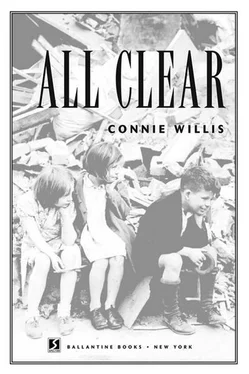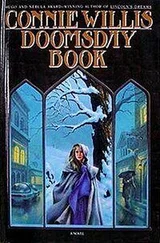Connie Willis - All Clear
Здесь есть возможность читать онлайн «Connie Willis - All Clear» весь текст электронной книги совершенно бесплатно (целиком полную версию без сокращений). В некоторых случаях можно слушать аудио, скачать через торрент в формате fb2 и присутствует краткое содержание. Жанр: Старинная литература, на английском языке. Описание произведения, (предисловие) а так же отзывы посетителей доступны на портале библиотеки ЛибКат.
- Название:All Clear
- Автор:
- Жанр:
- Год:неизвестен
- ISBN:нет данных
- Рейтинг книги:5 / 5. Голосов: 1
-
Избранное:Добавить в избранное
- Отзывы:
-
Ваша оценка:
- 100
- 1
- 2
- 3
- 4
- 5
All Clear: краткое содержание, описание и аннотация
Предлагаем к чтению аннотацию, описание, краткое содержание или предисловие (зависит от того, что написал сам автор книги «All Clear»). Если вы не нашли необходимую информацию о книге — напишите в комментариях, мы постараемся отыскать её.
All Clear — читать онлайн бесплатно полную книгу (весь текст) целиком
Ниже представлен текст книги, разбитый по страницам. Система сохранения места последней прочитанной страницы, позволяет с удобством читать онлайн бесплатно книгу «All Clear», без необходимости каждый раз заново искать на чём Вы остановились. Поставьте закладку, и сможете в любой момент перейти на страницу, на которой закончили чтение.
Интервал:
Закладка:
“He’ll be handcuffed. Colonel von Sprecht, not the bull. Come here and show me the route we take.”
Cess traced the route on the map for him. “We go through Winchester—that’s Canterbury—and then south to Portsmouth so he can see the invasion armada and then—”
then—”
“We can’t go through Winchester,” Ernest said. “Its cathedral doesn’t look anything like Canterbury’s. We’ll need to go around.” Cess nodded and made a note on the other map. “And we’d best steer clear of Salisbury. He’s likely to recognize the spire.”
“Which can be seen for miles,” Cess said, frustrated. “I’ll need to completely redo the route.”
Good, Ernest thought, it will keep you from constantly looking out the window.
Cess was making him nervous. What was taking them so long? They could have repatriated the entire German Army by now.
Cess calculated a new route, wrote it out for Ernest, and went over to the window again to check the sky. “What if the Americans have put new signposts up? If the colonel finds out where he is—”
“He won’t. Stop worrying. And stop talking. I need to finish memorizing this route before they bring him in,” Ernest said. Which got him five full minutes of silence, and then Cess said, “How long can it take to sign a few papers? You don’t suppose they’re checking up on us, do you? What if Algernon didn’t tell the camp commander what he’s up to, and when they find out we’re not who we say we are, they decide we’re spies?”
“We are spies.”
“You know what I mean.”
“They won’t think we’re spies. And the weather’s not clearing. Stop fretting. Haven’t you ever been to the films? Spies are supposed to possess an icy calm.”
“But what if—” The door opened and the sergeant came in again, followed by the camp commander, two guards, and—between them—the prisoner in a German officer’s uniform.
Ernest had been wrong—he wasn’t handcuffed. But there was no need for him to be. He leaned heavily on the arms of his guards, and his face was gray.
“Lieutenants,” the commander said, nodding at them, and then turned to the prisoner. “Colonel von Sprecht, you are being repatriated to Germany through a program instituted by the Swedish Red Cross. These two officers will drive you to London, where you will be put on a ship to Bremerhaven.”
Colonel von Sprecht gave no indication of understanding what the commander was saying. What if Tensing had been wrong, and he didn’t speak English? But when the commander asked, “Do you understand, Colonel?” he said, with only a trace of a German accent, “I understand very well.” He drew himself up as he spoke, but the guards nearly had to carry him out to the car. He didn’t look strong enough to survive the journey by car, let alone the sea voyage, and apparently Cess was thinking the same thing.
“What if he dies along the way?” he whispered as the guards put the colonel into the backseat.
Cess and Ernest climbed in. Ernest started the car and then adjusted the rear-vision mirror so he could see the colonel. He had leaned back against the rear seat, and his eyes were shut.
And if he stays like that the whole way, this scheme will have been for nothing, Ernest thought, driving south to Swindon, glancing occasionally in the mirror at the colonel. His eyes were still closed. Ernest drove into the town, feeling suddenly nervous. If there was even one signboard saying this was Swindon …
But Cess’s fears about the Americans having put up signs were unfounded, and the Home Guard or whoever had been in charge of taking down the signposts at the beginning of the war had done a thorough job. There was no name on the railway station and not even an arrow pointing to “Town Centre.”
“This is Brede, right?” Cess asked, looking at the map. When Ernest nodded, he said, “At the next turning, you go north to Horns Cross and take the Oxney Road to Beckley.”
“Shh. What if the colonel hears you?” Ernest said in a stage whisper.
“Don’t worry, he’s asleep,” Cess said, glancing back at him. “I don’t suppose we can stop in Nounsley, can we?”
“Why?”
“I know a girl there. A Wren. Name of Betty. She’s General Patton’s driver.”
“I thought Patton’s headquarters were in Essex. In Chelmsford.”
“They are, but she’s billeted in Nounsley, and she has a very understanding landlady. What do you say?”
“No,” Ernest said. “We can’t stop in Nounsley. Or Dover. You know our orders are to take the prisoner straight to London and hand him over to the War Ministry
—”
“Shh,” Cess said, jabbing a thumb toward the backseat. “He’s awake.”
Ernest glanced over his shoulder and then called back to him, “Colonel von Sprecht, are you comfortable back there?”
“Yes. Thank you,” the colonel said.
“If you need anything, sir, just ask. Our orders are to take good care of you.”
“Would you like some tea?” Cess held up their thermos.
“No, thank you.”
“A cigarette?”
“No,” he said curtly, but at least he was awake and looking at what they’d brought him this way to see: fields full of tents and army vehicles and equipment. Ernest had been worried about their being able to stay on the prescribed route without the aid of signposts, but it wouldn’t matter which road they took. Every one they passed, even narrow country lanes, was lined with Quonset huts or Jeeps parked bumper to bumper or mobile anti-aircraft guns. One of the pastures was crisscrossed with tank tracks just like the ones they’d so carefully made in that pasture. Only the tanks half hidden under the trees at the far end weren’t inflated rubber—they were the real thing. And so were the huge pyramids of oil drums and stacks of ammunition boxes farther on.
But when Ernest glanced in the mirror, the colonel’s eyes were closed again. They shouldn’t have brought such a comfortable car. “Colonel von Sprecht,” he called, “are you warm enough back there? Would you like a rug?”
“No,” he said without opening his eyes.
“It’s rather cold for May,” Ernest said, and when the colonel didn’t answer, Cess asked, “Do you have this sort of weather in Germany?” Still no answer.
“What part of Germany do you come from?” Ernest asked, and the colonel began to snore.
You can’t fall asleep, Ernest thought. We’re doing this for your benefit. He drove into a large mud hole, but even the jolt didn’t wake the colonel. Stopping would, but every field they passed was full of soldiers—drilling in formation, doing calisthenics, loading supplies, standing in line outside mess tents. One of them was bound to come over and ask them if they needed directions, so Ernest had no choice but to keep driving. Straight past everything the sleeping colonel was supposed to be to come over and ask them if they needed directions, so Ernest had no choice but to keep driving. Straight past everything the sleeping colonel was supposed to be seeing.
There was a village up ahead. Good. If there’s a garage there, I’ll stop for gas, he thought, but there wasn’t one on the village’s single street, and just ahead was, oh, Christ, a signpost. He wasn’t close enough to read it, but he could make out letters and arrows pointing in opposite directions. And there was no side lane he could turn off onto.
He glanced in the rear-vision mirror, hoping to God the colonel was still asleep. He wasn’t. And in a minute he’d see the signpost. “Look!” Ernest said, pointing off to the other side of the road. “Parachutists!”
“Where?” Cess said. He leaned across him to look, and the colonel followed his gaze.
“There,” Ernest said, pointing at nothing. “I hear the Americans are planning to land twenty thousand parachutists in the Pas de Calais area the night before they invade,” and while Cess and the colonel were gawking at the sky, he shot past the signpost.
Читать дальшеИнтервал:
Закладка:
Похожие книги на «All Clear»
Представляем Вашему вниманию похожие книги на «All Clear» списком для выбора. Мы отобрали схожую по названию и смыслу литературу в надежде предоставить читателям больше вариантов отыскать новые, интересные, ещё непрочитанные произведения.
Обсуждение, отзывы о книге «All Clear» и просто собственные мнения читателей. Оставьте ваши комментарии, напишите, что Вы думаете о произведении, его смысле или главных героях. Укажите что конкретно понравилось, а что нет, и почему Вы так считаете.












